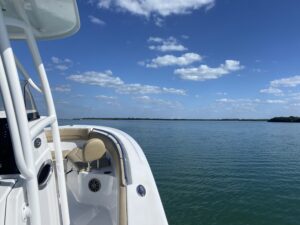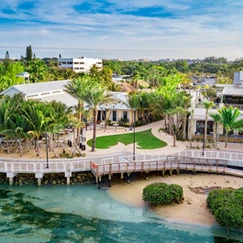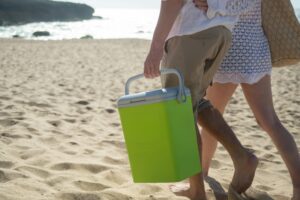As temperatures increase in Florida, so does our time outdoors. And because the sun isn’t blazing hot yet, it’s easy to forget that our skin and eyes still needs protection from its rays. Here’s what you need to know to stay safe in the sun with Gulfstream Boat Club—for yourself and all those you love—as we head into the sunny seasons!
SPF – Not Just for the Sunny Days!
Ultraviolet rays are always present, and they are the cause of sun damage and skin cancer. Ultraviolet rays are not blocked by the clouds so even if the sun isn’t visible, you’re still exposed to ultraviolet rays. Sunscreen blocks these rays and reduces your chances of getting a sunburn. Look for a broad spectrum sunscreen with an SPF of 30+ for the best chance of being protected from the sun. Broad spectrum sunscreens protect you from UVB rays and UVA rays. Also be sure you apply sunscreen all over your body, and not just your face!
Tips for Picking a Sunscreen
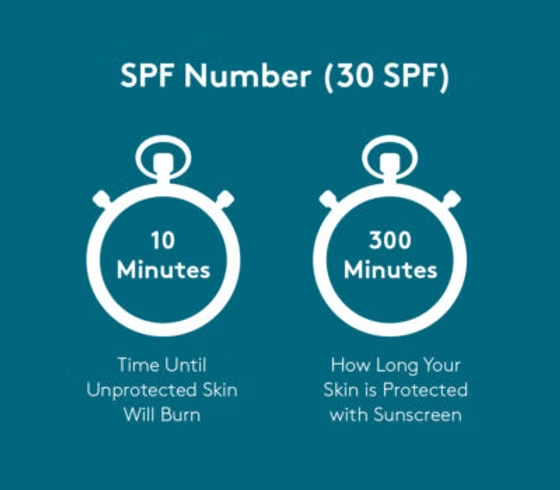
Choosing a sunscreen product can be overwhelming with all of the different options available. But when choosing a sunscreen you need to be sure you are doing the most to stay safe in the sun. One of the most important things to look for when choosing products is the level of SPF, keeping in mind an SPF of 30 or higher will ensure that your skin is fully protected, even on cloudy days. Remember to always reapply sunscreen after swimming or using a towel, and always choose a product with “broad spectrum” coverage.
Choose the Environmentally Friendly SPF Option
What does “Reef-safe” or “Reef-friendly” Sunscreen Mean? Terms like “reef-safe” or “reef-friendly” are typically used to identify sunscreens that do not contain oxybenzone and octinoxate, two common UV-blocking chemicals, that studies have shown can cause coral bleaching. When coral is compromised, it is less likely to fight off the effects of climate change, and when it’s diseased or dead, it is uninhabitable for a myriad of sea life to call it home, and stops protecting us from hurricanes and storms. Ocean plants and phytoplankton in coral reefs produce up to 85% of the oxygen we breathe, and provide habitats and shelter for marine organisms. In short, let’s not mess with the coral, unless we want it to mess with us right back.
Here are a few Reef Friendly and High Quality Sunscreens and we love:
Sun Bum Mineral SPF 50 Moisturizing Sunscreen Lotion
Not only is this zinc-based mineral sunscreen by Sun Bum reef-friendly, it’s also hypoallergenic, gluten- and cruelty-free, so you can enjoy broad-spectrum UV protection without having to worry about skin irritation.
Babo Botanicals Clear Zinc Sunscreen SPF 30
Specially formulated for super-sensitive skin, Babo Botanicals Clear Zinc Sunscreen is fast-absorbing and non-whitening. The 100% non-nano zinc formula provides 80 minutes of water- and sweat-resistant coverage. Perfect for your next boat day with the family!
Blue Lizard Sensitive Mineral Sunscreen Stick SPF 50
If you’ve experienced one too many lotion tubes popping open in your beach bag, then give this sunscreen stick by Blue Lizard a whirl. It’s a breeze to apply and features a 100% non-nano formula, as well as aloe vera, shea butter, sunflower seed oil and vitamin E for added skin nourishment.
Raw Elements Face + Body Tube SPF 30 Bio-Resin Tube
This formula is the conscious consumer’s answer to serious full body sunscreen. Made from certified all-natural ingredients, it provides UVA-UVB true broad spectrum protection. As a performance driven sunscreen, it is very water resistant beyond 80 minutes, yet so gentle and moisturizing it is perfect for kids. Packed with biologically active antioxidants, vitamins, minerals and extracts, it continues protecting your skin long after environmental exposure
According to the American Cancer Society, keep these extra steps in mind to stay safe in the sun for an afternoon of fun:
- Seek shade: Limit your direct exposure to the sun, especially between 10 a.m. and 4 p.m., when UV rays are strongest.
- Cover up: When you are out, wear clothing and a wide-brimmed hat to protect as much skin as possible. Protect your eyes with wrap-around sunglasses that block at least 99% of UV light.
- Use a broad-spectrum sunscreen with an SPF of at least 30: Reapply at least every 2 hours, as well as after swimming or sweating.
- Avoid tanning beds and sunlamps: Both can cause serious long-term skin damage and contribute to skin cancer.
Sunglasses – More than an Accessory
Sunglasses aren’t an optional summertime accessory, they’re an essential piece of safety equipment for longterm eye health. To stay safe in the sun, be sure you are packing the sunglasses that will keep you protected all day. Long-term exposure to the sun without proper protection can increase the risk of eye disease, including cataract and eye cancer. As the sunny seasons get underway, always remember to pack a pair of sunglasses for everyone on board. (And keep a spare pair in your boat bag! You never know when you might need them! )
Polarized Protection
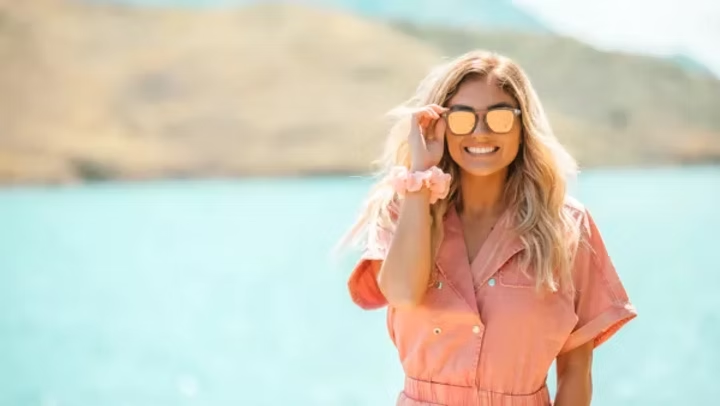
Light travels in waves, which means it vibrates. Normally, light vibrates in multiple directions. But when light bounces off a horizontal surface like snow, water, or the roof of a car, it only vibrates in one direction, horizontally. This process is called polarization.
Because the light is only vibrating in one direction, it becomes concentrated, hitting the eye directly. We call this concentrated light, “glare.” The difference between polarized and non-polarized lenses is how they handle glare.
Polarized lenses have a special chemical applied to them to filter light. The chemical’s molecules are lined up specifically to block some of the light from passing through the lens. Think of it like a mini-blind hanging in front of a window. Only light that passes through the blind’s openings can be seen, and this helps to keep your eyes safe from the sun!
Enjoy Fun in the Sun with Gulfstream Boat Club
We’re dedicated to helping members experience the best of life on the water with none of the hassles. We believe boating is the perfect way to spend time with family and friends outdoors, and visiting local attractions and hidden gems, while keeping your loved ones safe.
You have to be a member to know the difference joining a premium boat club makes. Join before it’s too late! Contact us today to learn about our Club locations that are currently accepting members this season.
#protectyourskin #sunbum #polarizedsunglasses #rawelements #sunprotection #babobotanicals #sunglasses #sunscreenwelove #sunshine #boatingwithkids #SPF #reeffriendlysunscreen #boatbag #bluelizard #packaboatbag #sunscreen
